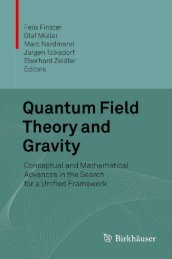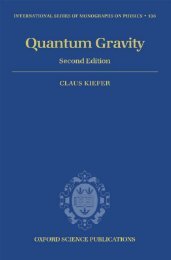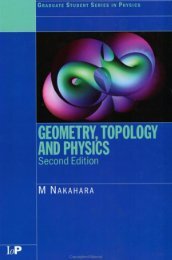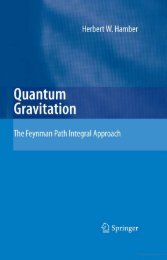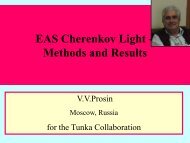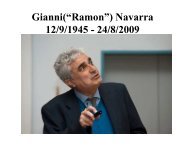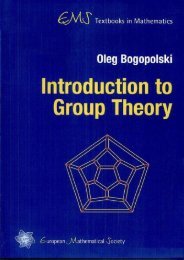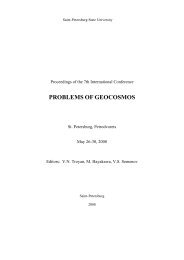- Page 2:
This page intentionally left blank
- Page 8:
APPROACHES TO QUANTUM GRAVITYToward
- Page 12:
A Sandra
- Page 18:
viiiContents11 String theory, holog
- Page 22:
ContributorsJ. AmbjørnThe Niels Bo
- Page 26:
xiiList of contributorsD. OritiMax
- Page 32:
PrefaceQuantum Gravity is a dream,
- Page 36:
Prefacexviiare following in their s
- Page 40:
Prefacexixenormous amount of progre
- Page 48:
1Unfinished revolutionC. ROVELLIOne
- Page 52:
Unfinished revolution 5wit of empir
- Page 56:
Unfinished revolution 7In general r
- Page 60:
Unfinished revolution 9However, res
- Page 64:
Unfinished revolution 11References[
- Page 68:
2The fundamental nature of space an
- Page 72:
The fundamental nature of space and
- Page 76:
The fundamental nature of space and
- Page 80:
The fundamental nature of space and
- Page 84:
The fundamental nature of space and
- Page 88:
The fundamental nature of space and
- Page 92:
The fundamental nature of space and
- Page 96:
Does locality fail at intermediate
- Page 100:
Does locality fail at intermediate
- Page 104:
Does locality fail at intermediate
- Page 108:
Does locality fail at intermediate
- Page 112:
Does locality fail at intermediate
- Page 116:
∫Does locality fail at intermedia
- Page 120:
Does locality fail at intermediate
- Page 124:
Does locality fail at intermediate
- Page 128:
Does locality fail at intermediate
- Page 132:
Prolegomena to any future Quantum G
- Page 136:
Prolegomena to any future Quantum G
- Page 140:
Prolegomena to any future Quantum G
- Page 144:
Prolegomena to any future Quantum G
- Page 148:
Prolegomena to any future Quantum G
- Page 152:
Prolegomena to any future Quantum G
- Page 156:
Prolegomena to any future Quantum G
- Page 160:
Prolegomena to any future Quantum G
- Page 164:
Prolegomena to any future Quantum G
- Page 168:
Prolegomena to any future Quantum G
- Page 172:
Prolegomena to any future Quantum G
- Page 176:
Prolegomena to any future Quantum G
- Page 180:
Spacetime symmetries in histories c
- Page 184:
Spacetime symmetries in histories c
- Page 188:
Spacetime symmetries in histories c
- Page 192:
Spacetime symmetries in histories c
- Page 196:
Spacetime symmetries in histories c
- Page 200:
Spacetime symmetries in histories c
- Page 204:
Spacetime symmetries in histories c
- Page 208:
Spacetime symmetries in histories c
- Page 212:
Categorical geometry and the mathem
- Page 216:
Categorical geometry and the mathem
- Page 220:
Categorical geometry and the mathem
- Page 224:
Categorical geometry and the mathem
- Page 228:
Categorical geometry and the mathem
- Page 232:
Categorical geometry and the mathem
- Page 236:
Categorical geometry and the mathem
- Page 240:
7Emergent relativityO. DREYER7.1 In
- Page 244:
A(a)Emergent relativity 101(b)(c)B(
- Page 248:
Emergent relativity 103It is here t
- Page 252:
Emergent relativity 105spacetime co
- Page 256:
Emergent relativity 107φABFig. 7.4
- Page 260:
Emergent relativity 109If, on the o
- Page 264:
8Asymptotic safetyR. PERCACCI8.1 In
- Page 268:
Asymptotic safety 113field and the
- Page 272:
Asymptotic safety 115For example, t
- Page 276:
Asymptotic safety 117If we choose k
- Page 280:
Asymptotic safety 119complex fields
- Page 284:
Asymptotic safety 1212G ~ ~1.510.5-
- Page 288:
Asymptotic safety 123larger, and it
- Page 292:
Asymptotic safety 125Dimensional an
- Page 296:
Asymptotic safety 127References[1]
- Page 300:
9New directions in background indep
- Page 304:
New directions in background indepe
- Page 308:
New directions in background indepe
- Page 312:
New directions in background indepe
- Page 316:
New directions in background indepe
- Page 320:
New directions in background indepe
- Page 324:
New directions in background indepe
- Page 328:
New directions in background indepe
- Page 332:
New directions in background indepe
- Page 336:
New directions in background indepe
- Page 340:
New directions in background indepe
- Page 344:
Questions and answers 151Quantum Gr
- Page 348:
Questions and answers 153was that t
- Page 352:
Questions and answers 155causality
- Page 356:
Questions and answers 157to hold),
- Page 360:
Questions and answers 159of how gra
- Page 364:
Questions and answers 161the action
- Page 368:
Questions and answers 163allow us t
- Page 372:
Questions and answers 165- A-F.Mark
- Page 380:
10Gauge/gravity dualityG. HOROWITZ
- Page 384:
Gauge/gravity duality 171strong and
- Page 388:
Gauge/gravity duality 173decomposed
- Page 392:
Gauge/gravity duality 175Here l s i
- Page 396:
Gauge/gravity duality 177There is a
- Page 400:
Gauge/gravity duality 179these are
- Page 404:
Gauge/gravity duality 181leading to
- Page 408:
Gauge/gravity duality 183states to
- Page 412:
Gauge/gravity duality 185[6] N. Ber
- Page 416:
11String theory, holography and Qua
- Page 420:
String theory, holography and Quant
- Page 424:
String theory, holography and Quant
- Page 428:
String theory, holography and Quant
- Page 432:
String theory, holography and Quant
- Page 436:
String theory, holography and Quant
- Page 440:
String theory, holography and Quant
- Page 444:
String theory, holography and Quant
- Page 448:
String theory, holography and Quant
- Page 452:
String theory, holography and Quant
- Page 456:
String theory, holography and Quant
- Page 460:
String theory, holography and Quant
- Page 464:
String field theory 211no tools to
- Page 468:
String field theory 213made an insi
- Page 472:
(d) Cyclicity: ∫ ⋆= (−1) G G
- Page 476:
String field theory 217however, the
- Page 480:
String field theory 21912.2.3 Outst
- Page 484:
String field theory 221a review) gi
- Page 488:
String field theory 223similar comp
- Page 492:
String field theory 225this; the ph
- Page 496:
String field theory 227[11] T. G. E
- Page 500:
Questions and answers• Q - D. Ori
- Page 504:
Questions and answers 231condition
- Page 508:
Part IIILoop quantum gravity and sp
- Page 514:
236 T. Thiemann(anti)commute. We se
- Page 518:
238 T. ThiemannNotice that in gener
- Page 522:
240 T. Thiemannspectrum of all the
- Page 526:
242 T. Thiemannorder to avoid anoma
- Page 530:
244 T. ThiemannWe consider spacetim
- Page 534:
246 T. ThiemannHence both gauge gro
- Page 538:
248 T. Thiemannthat Ĉ(N) cannot be
- Page 542:
250 T. Thiemann[8] R. Brunetti, K.
- Page 546:
252 T. Thiemann[48] M. Bojowald, H.
- Page 550:
254 E. LivineSU(2) gauge theory. Th
- Page 554:
256 E. Livinespace; η IJ is the fl
- Page 558:
258 E. LivineHowever, in contrast t
- Page 562:
260 E. Livine(i) Either we work wit
- Page 566:
262 E. LivineAt the end of the day,
- Page 570:
264 E. Livineprojector at the end v
- Page 574:
266 E. Livinefor a surface S inters
- Page 578:
268 E. LivineThis constraint is sat
- Page 582:
270 E. Livinewe do not need the sec
- Page 586:
15The spin foam representation of l
- Page 590:
274 A. Perezin classical general re
- Page 594:
276 A. Perezwhere M = ×R (for an
- Page 598:
278 A. Perezthe Levi-Civita tensor.
- Page 602:
280 A. PerezkTr[ k (W p )] ✄jP=
- Page 606:
282 A. Perezjjjkjkmkmjjjjmkmkmkmkkj
- Page 610:
284 A. PerezHere we studied the int
- Page 614:
286 A. PerezA spin foam representat
- Page 618:
288 A. Perezmaster-constraint progr
- Page 622:
16Three-dimensional spin foam Quant
- Page 626:
292 L. Freidel16.3 The Ponzano-Regg
- Page 630:
294 L. Freidelunder usual gauge tra
- Page 634:
296 L. Freidelis now constrained to
- Page 638:
298 L. Freidel16.4.1 Mathematical s
- Page 642:
300 L. FreidelTherefore, at first o
- Page 646:
302 L. FreidelThe inverse group Fou
- Page 650:
304 L. FreidelFrom this identity, i
- Page 654: 306 L. Freidelchoice of statistics.
- Page 658: 308 L. FreidelA deeper study of the
- Page 662: 17The group field theory approach t
- Page 666: 312 D. Oritisimplicial complex, or
- Page 670: 314 D. Oritiare not all simultaneou
- Page 674: 316 D. Oritidiagrams correspond to
- Page 678: 318 D. Oritiis the simple fact that
- Page 682: 320 D. Oritibetter, by a single mat
- Page 686: 322 D. Oritior SO(3, 1)) [8; 9; 10]
- Page 690: 324 D. Oritiwhere: g i ∈ G, s i
- Page 694: 326 D. Oritiobservables in GFTs are
- Page 698: 328 D. Oritiresearch. On the other
- Page 702: 330 D. Oritiof the possibility of a
- Page 708: Questions and answers 333the holes
- Page 712: Questions and answers 335their vacu
- Page 716: Questions and answers 337of some so
- Page 724: 18Quantum Gravity: the art of build
- Page 728: Quantum Gravity: the art of buildin
- Page 732: Quantum Gravity: the art of buildin
- Page 736: Quantum Gravity: the art of buildin
- Page 740: Quantum Gravity: the art of buildin
- Page 744: Quantum Gravity: the art of buildin
- Page 748: Quantum Gravity: the art of buildin
- Page 752: Quantum Gravity: the art of buildin
- Page 756:
Quantum Gravity: the art of buildin
- Page 760:
Quantum Gravity: the art of buildin
- Page 764:
Quantum Regge calculus 361is given
- Page 768:
Quantum Regge calculus 363group. We
- Page 772:
Quantum Regge calculus 365emanating
- Page 776:
Quantum Regge calculus 367We will s
- Page 780:
Quantum Regge calculus 369reason, d
- Page 784:
Quantum Regge calculus 371gravitati
- Page 788:
Quantum Regge calculus 373where ξ
- Page 792:
Quantum Regge calculus 375[4] J. W.
- Page 796:
Quantum Regge calculus 377[52] M. L
- Page 800:
Consistent discretizations as a roa
- Page 804:
Consistent discretizations as a roa
- Page 808:
Consistent discretizations as a roa
- Page 812:
Consistent discretizations as a roa
- Page 816:
Consistent discretizations as a roa
- Page 820:
Consistent discretizations as a roa
- Page 824:
Consistent discretizations as a roa
- Page 828:
21The causal set approach to Quantu
- Page 832:
The causal set approach to Quantum
- Page 836:
The causal set approach to Quantum
- Page 840:
The causal set approach to Quantum
- Page 844:
The causal set approach to Quantum
- Page 848:
The causal set approach to Quantum
- Page 852:
The causal set approach to Quantum
- Page 856:
The causal set approach to Quantum
- Page 860:
The causal set approach to Quantum
- Page 864:
The causal set approach to Quantum
- Page 868:
The causal set approach to Quantum
- Page 872:
The causal set approach to Quantum
- Page 876:
The causal set approach to Quantum
- Page 880:
The causal set approach to Quantum
- Page 884:
The causal set approach to Quantum
- Page 888:
The causal set approach to Quantum
- Page 896:
22Quantum Gravity phenomenologyG. A
- Page 900:
Quantum Gravity phenomenology 429Ta
- Page 904:
Quantum Gravity phenomenology 431th
- Page 908:
Quantum Gravity phenomenology 433co
- Page 912:
Quantum Gravity phenomenology 435po
- Page 916:
Quantum Gravity phenomenology 437Fr
- Page 920:
Quantum Gravity phenomenology 439le
- Page 924:
Quantum Gravity phenomenology 441pr
- Page 928:
Quantum Gravity phenomenology 443wa
- Page 932:
Quantum Gravity phenomenology 445is
- Page 936:
Quantum Gravity phenomenology 447sc
- Page 940:
Quantum Gravity phenomenology 449[2
- Page 944:
Quantum Gravity and precision tests
- Page 948:
Quantum Gravity and precision tests
- Page 952:
Quantum Gravity and precision tests
- Page 956:
Quantum Gravity and precision tests
- Page 960:
Quantum Gravity and precision tests
- Page 964:
Quantum Gravity and precision tests
- Page 968:
Quantum Gravity and precision tests
- Page 972:
Quantum Gravity and precision tests
- Page 976:
Algebraic approach to Quantum Gravi
- Page 980:
Algebraic approach to Quantum Gravi
- Page 984:
Algebraic approach to Quantum Gravi
- Page 988:
Algebraic approach to Quantum Gravi
- Page 992:
Algebraic approach to Quantum Gravi
- Page 996:
Algebraic approach to Quantum Gravi
- Page 1000:
Algebraic approach to Quantum Gravi
- Page 1004:
Algebraic approach to Quantum Gravi
- Page 1008:
Algebraic approach to Quantum Gravi
- Page 1012:
Algebraic approach to Quantum Gravi
- Page 1016:
Algebraic approach to Quantum Gravi
- Page 1020:
Algebraic approach to Quantum Gravi
- Page 1024:
Algebraic approach to Quantum Gravi
- Page 1028:
25Doubly special relativityJ. KOWAL
- Page 1032:
Doubly special relativity 495DSR to
- Page 1036:
Doubly special relativity 497On the
- Page 1040:
Doubly special relativity 499some o
- Page 1044:
Doubly special relativity 501[x 0 ,
- Page 1048:
Doubly special relativity 503that t
- Page 1052:
Doubly special relativity 505can be
- Page 1056:
Doubly special relativity 507scale,
- Page 1060:
26From quantum reference frames to
- Page 1064:
From quantum reference frames to de
- Page 1068:
From quantum reference frames to de
- Page 1072:
From quantum reference frames to de
- Page 1076:
From quantum reference frames to de
- Page 1080:
From quantum reference frames to de
- Page 1084:
From quantum reference frames to de
- Page 1088:
From quantum reference frames to de
- Page 1092:
From quantum reference frames to de
- Page 1096:
From quantum reference frames to de
- Page 1100:
Lorentz invariance violation & its
- Page 1104:
Lorentz invariance violation & its
- Page 1108:
Lorentz invariance violation & its
- Page 1112:
Lorentz invariance violation & its
- Page 1116:
Lorentz invariance violation & its
- Page 1120:
Lorentz invariance violation & its
- Page 1124:
Lorentz invariance violation & its
- Page 1128:
Lorentz invariance violation & its
- Page 1132:
Lorentz invariance violation & its
- Page 1136:
Lorentz invariance violation & its
- Page 1140:
Generic predictions of quantum theo
- Page 1144:
Generic predictions of quantum theo
- Page 1148:
Generic predictions of quantum theo
- Page 1152:
Generic predictions of quantum theo
- Page 1156:
Generic predictions of quantum theo
- Page 1160:
Generic predictions of quantum theo
- Page 1164:
Generic predictions of quantum theo
- Page 1168:
Generic predictions of quantum theo
- Page 1172:
Generic predictions of quantum theo
- Page 1176:
Generic predictions of quantum theo
- Page 1180:
Generic predictions of quantum theo
- Page 1184:
Questions and answers• Q - L. Cra
- Page 1188:
Questions and answers 573frame. Jus
- Page 1192:
Questions and answers 575- A - J. K
- Page 1196:
Questions and answers 577where this
- Page 1200:
Questions and answers 579would allo
- Page 1204:
Index 581cosmology, 26, 155, 184, 1
- Page 1208:
Index 583emergent, 99, 109, 163, 17




